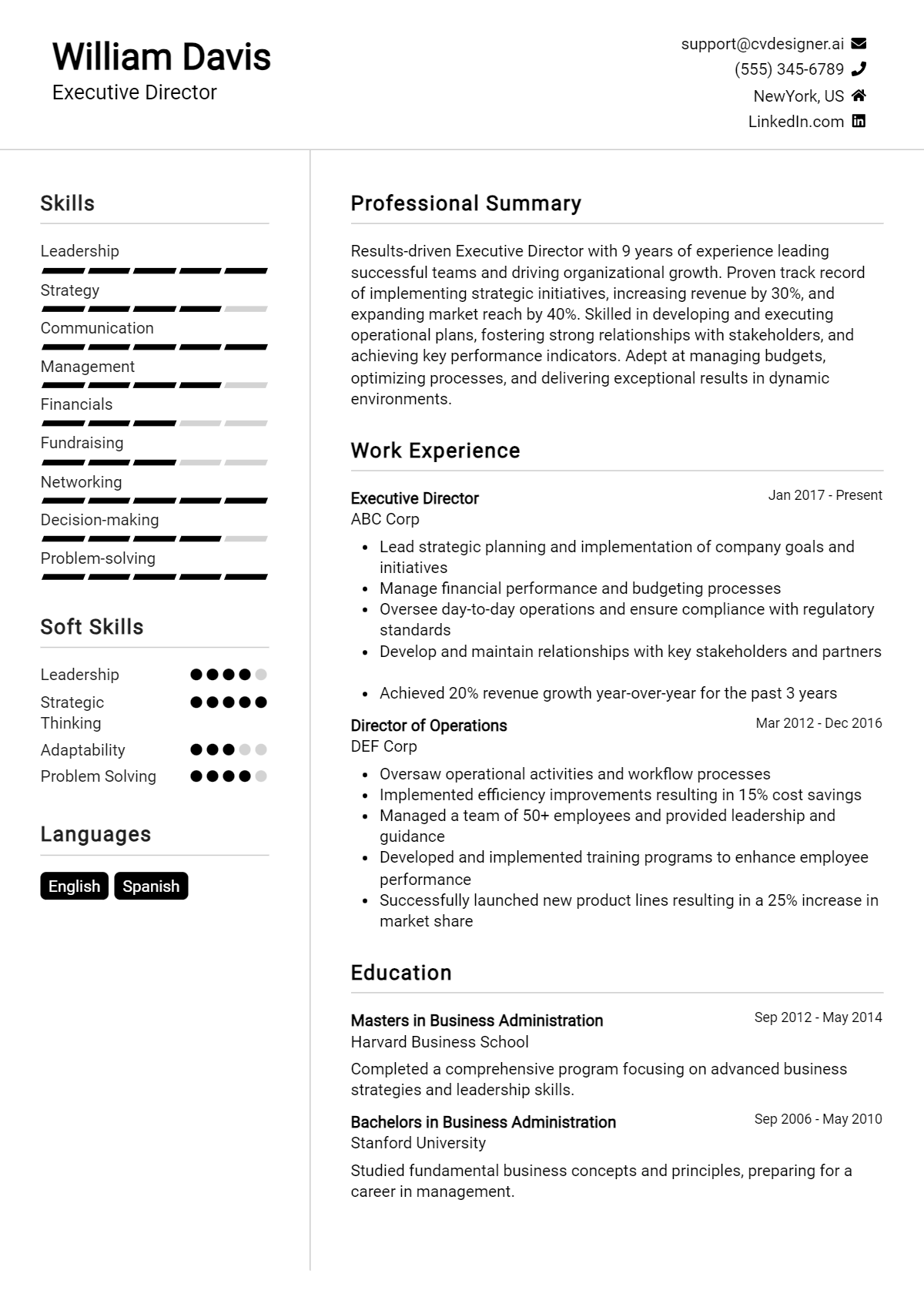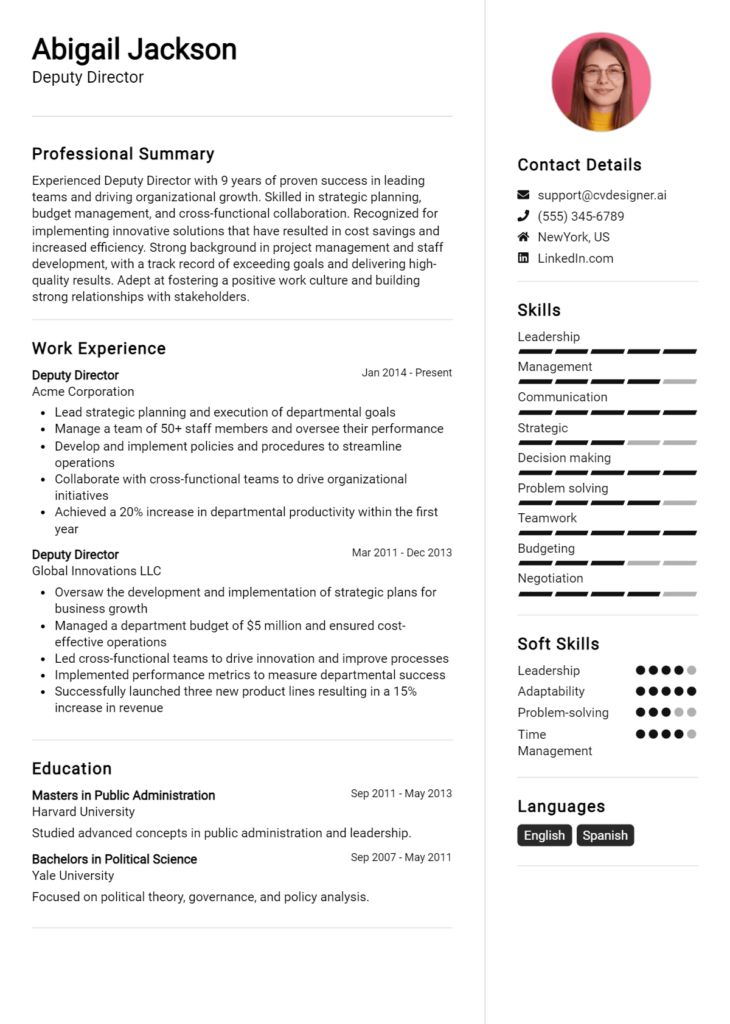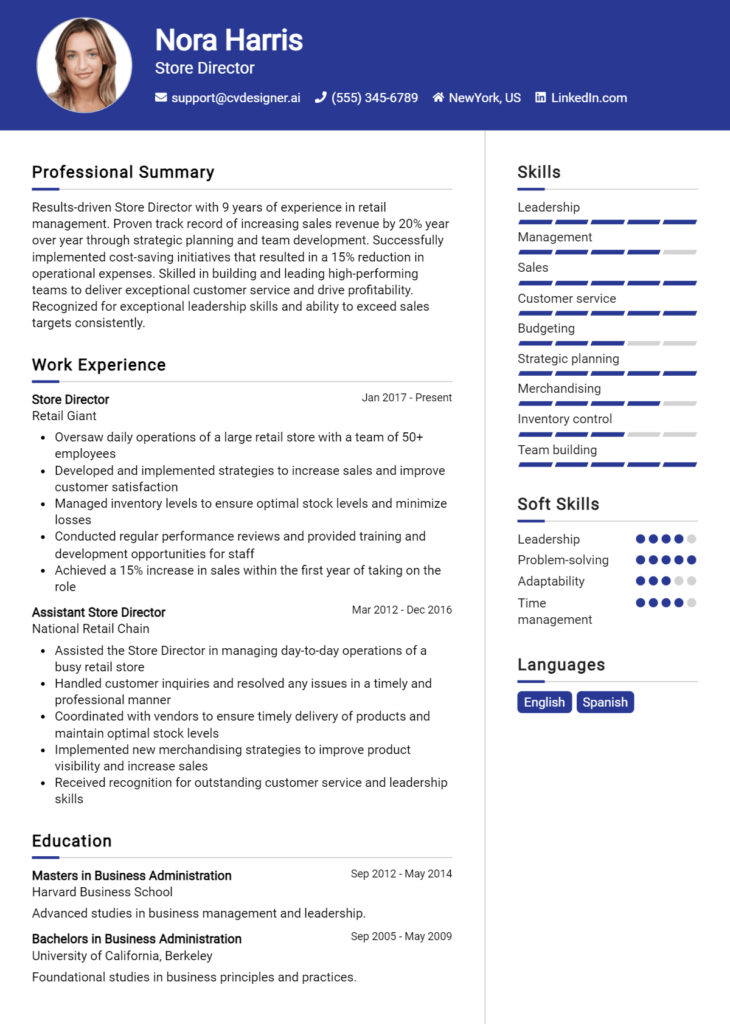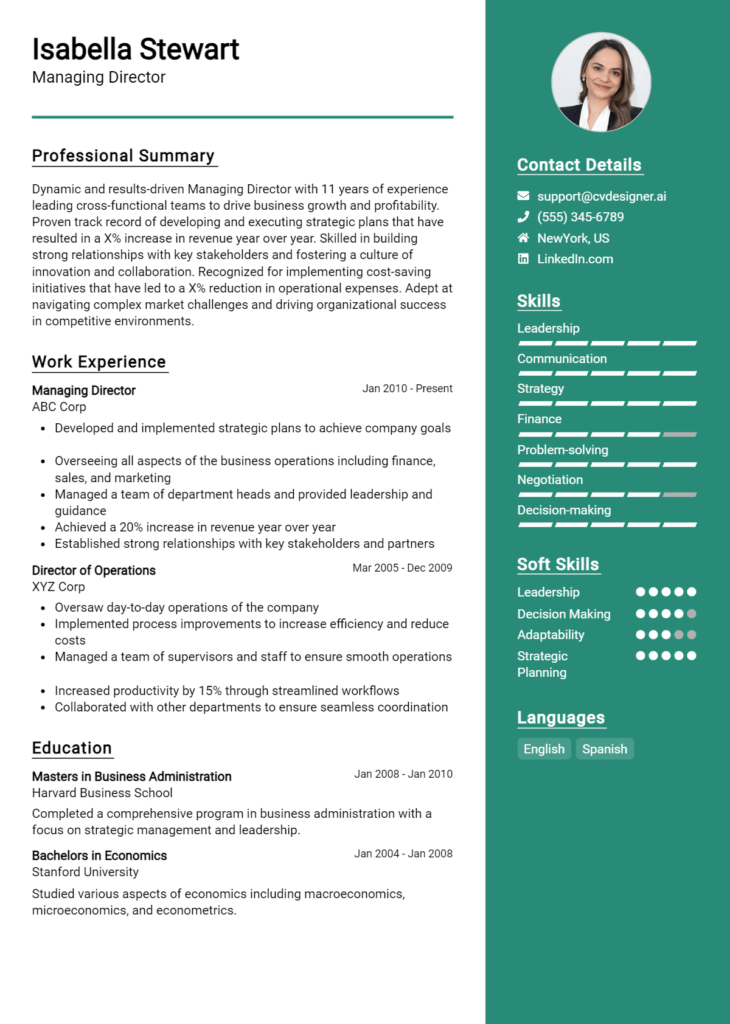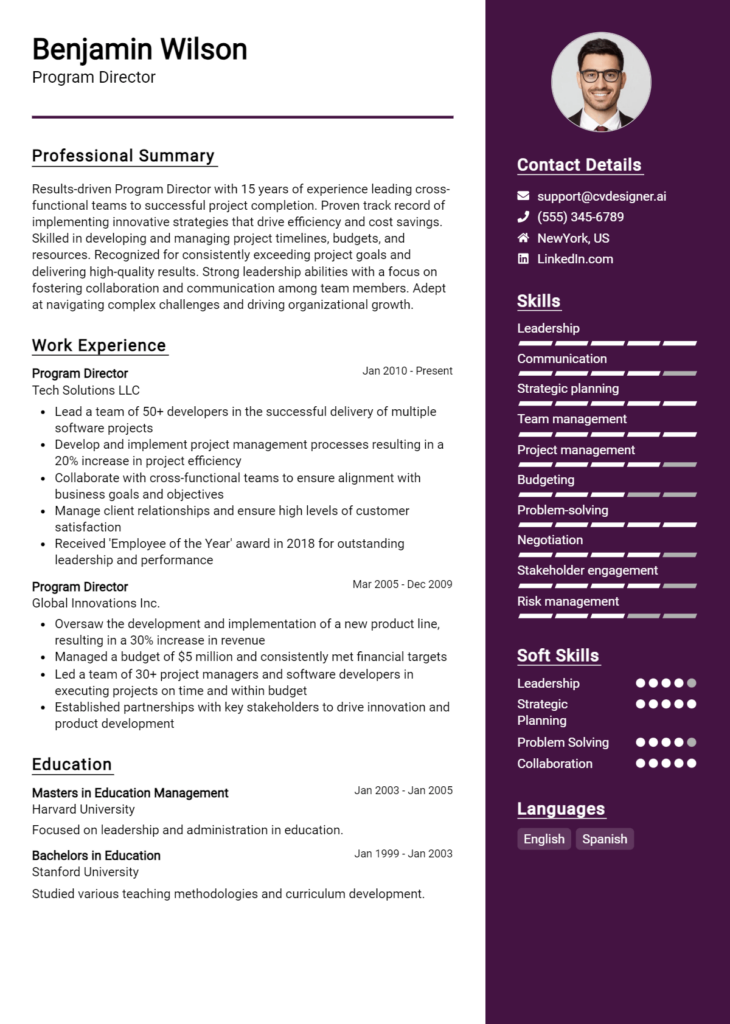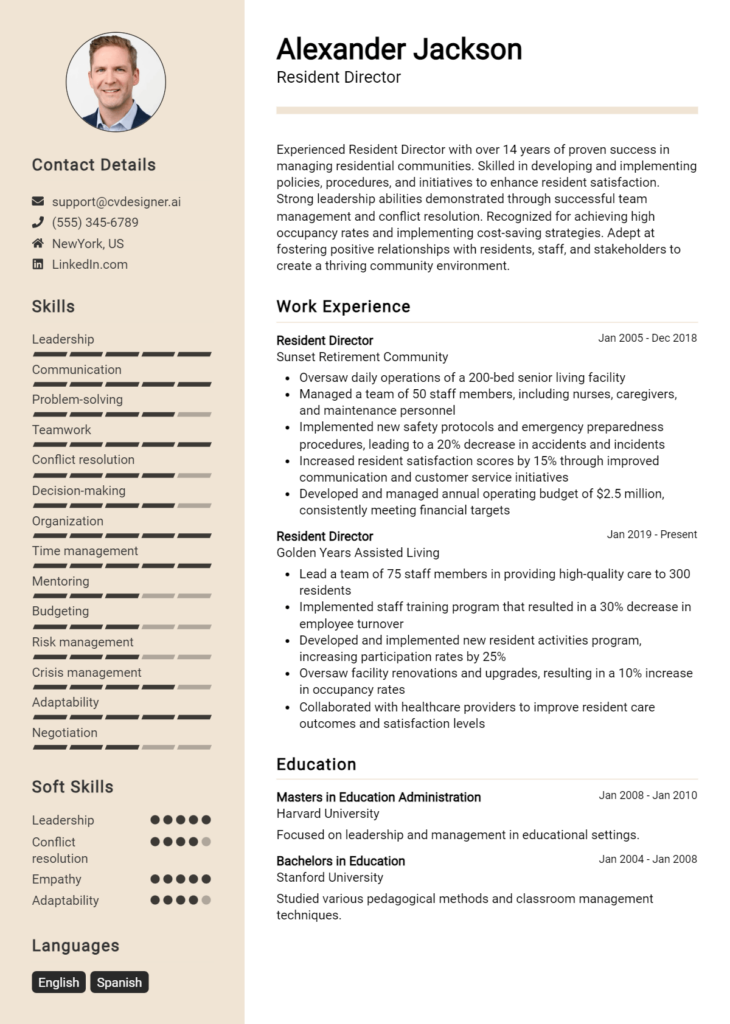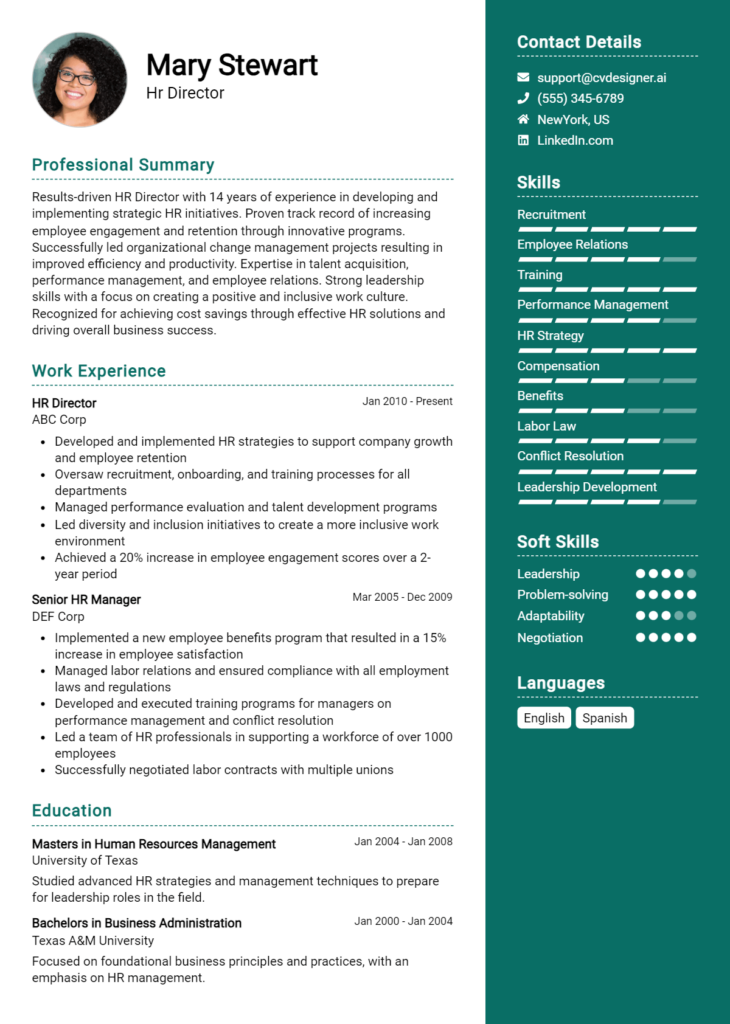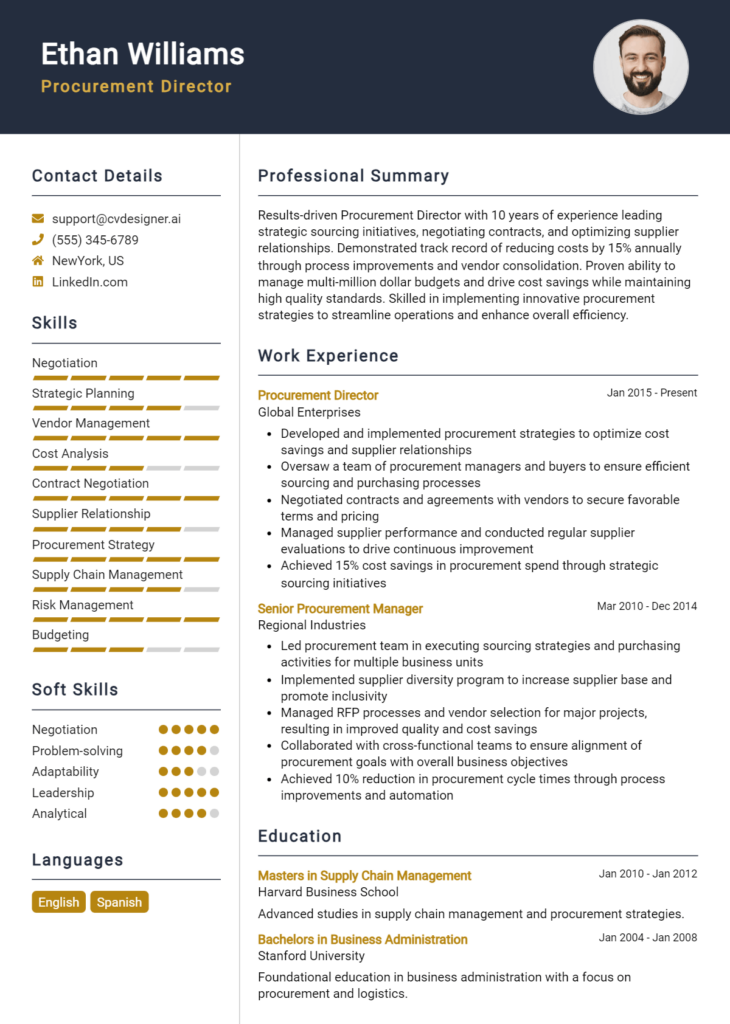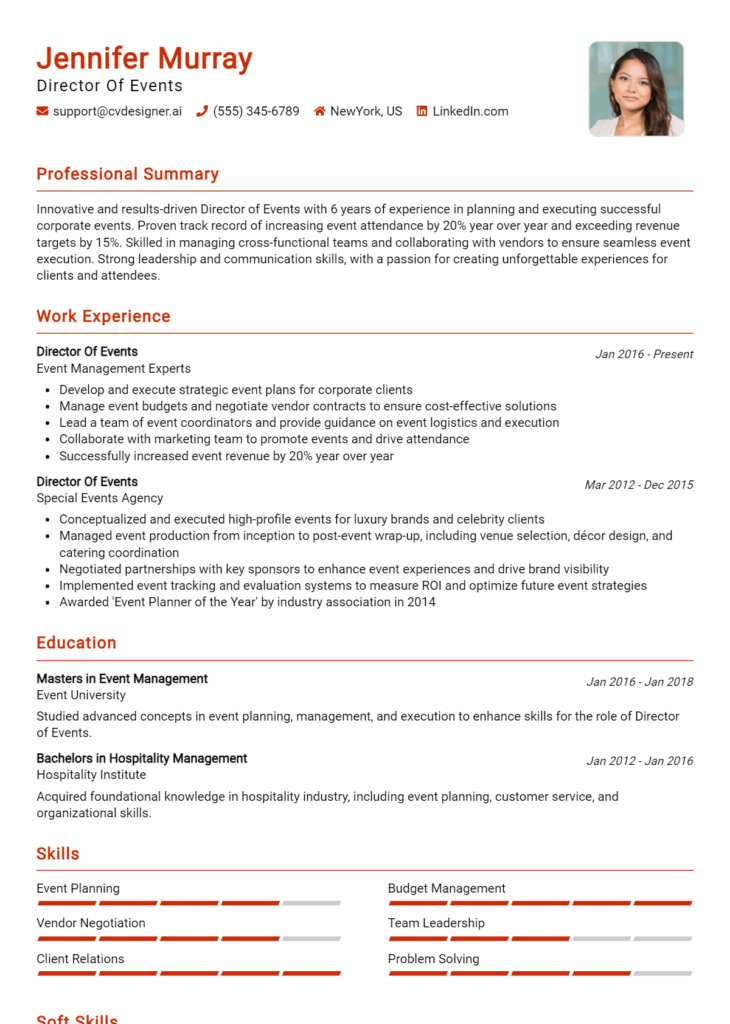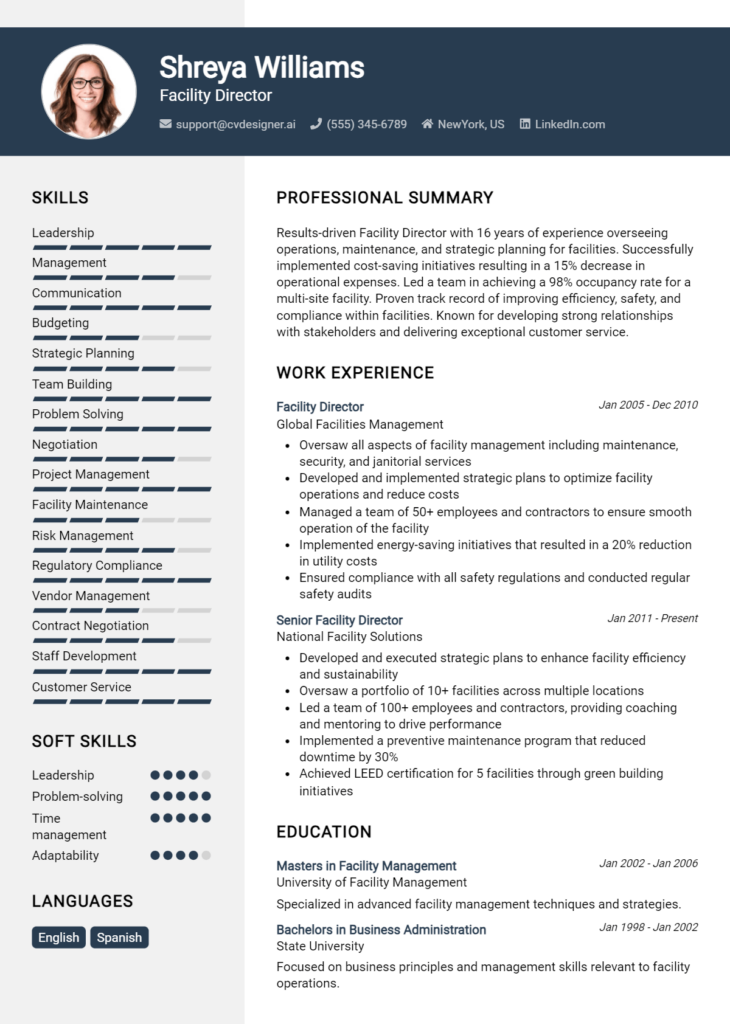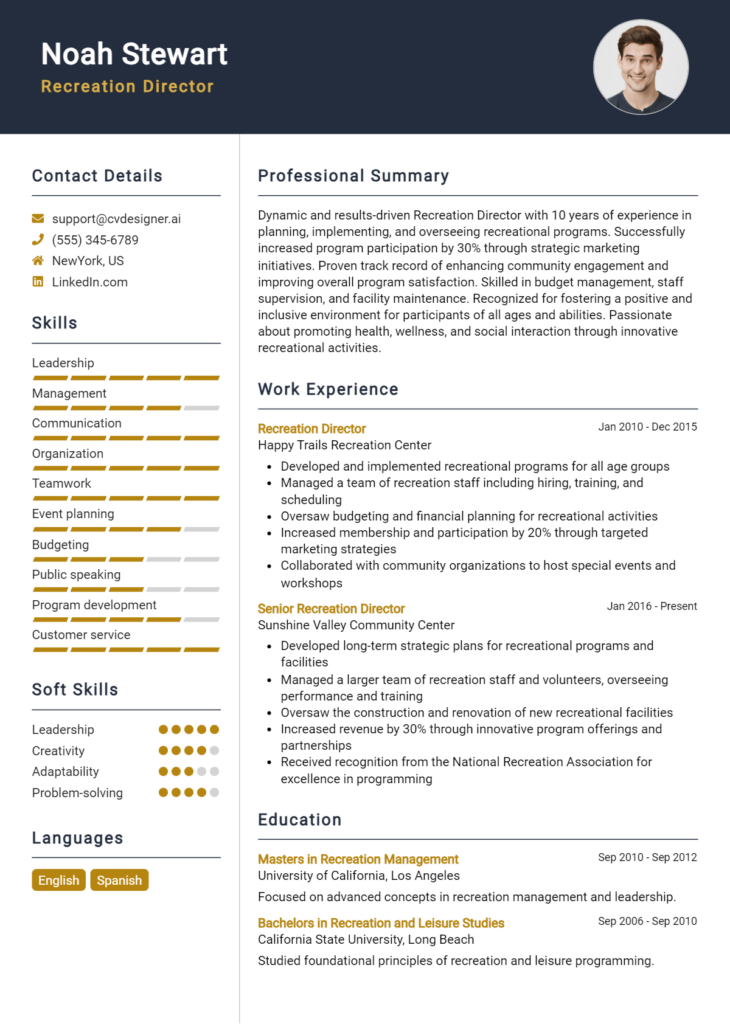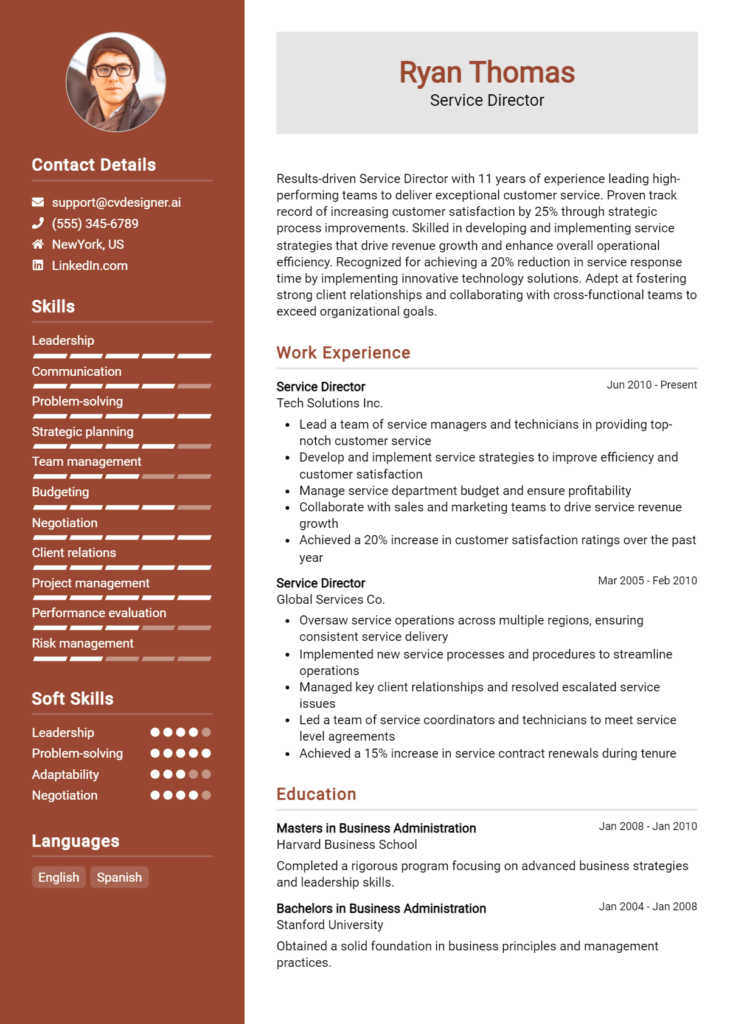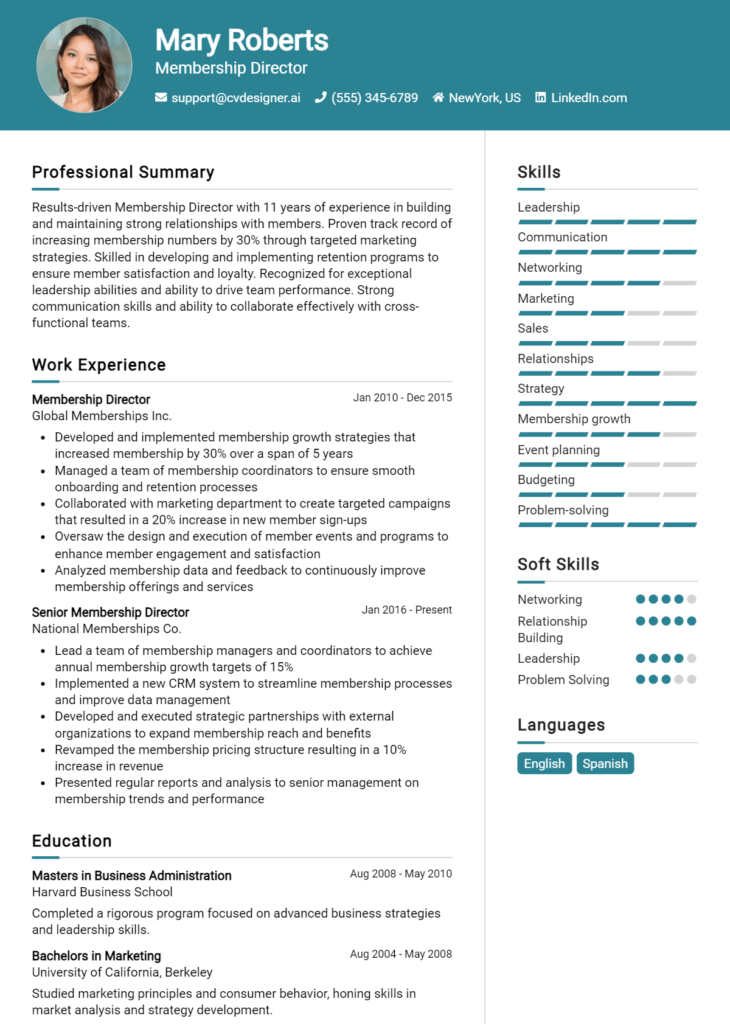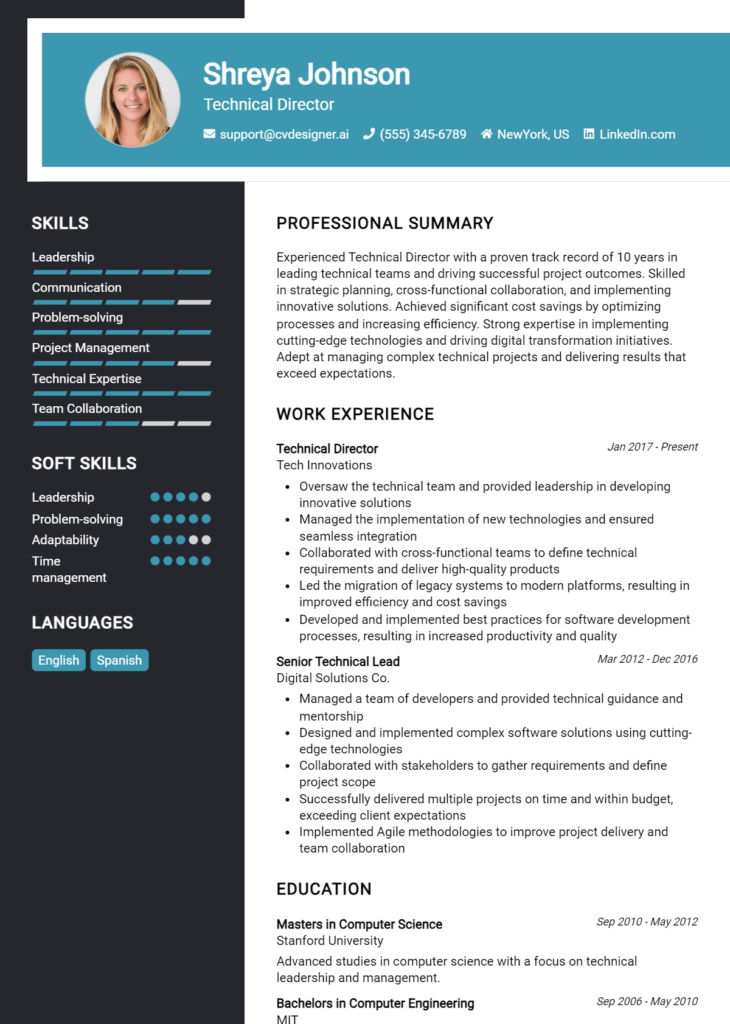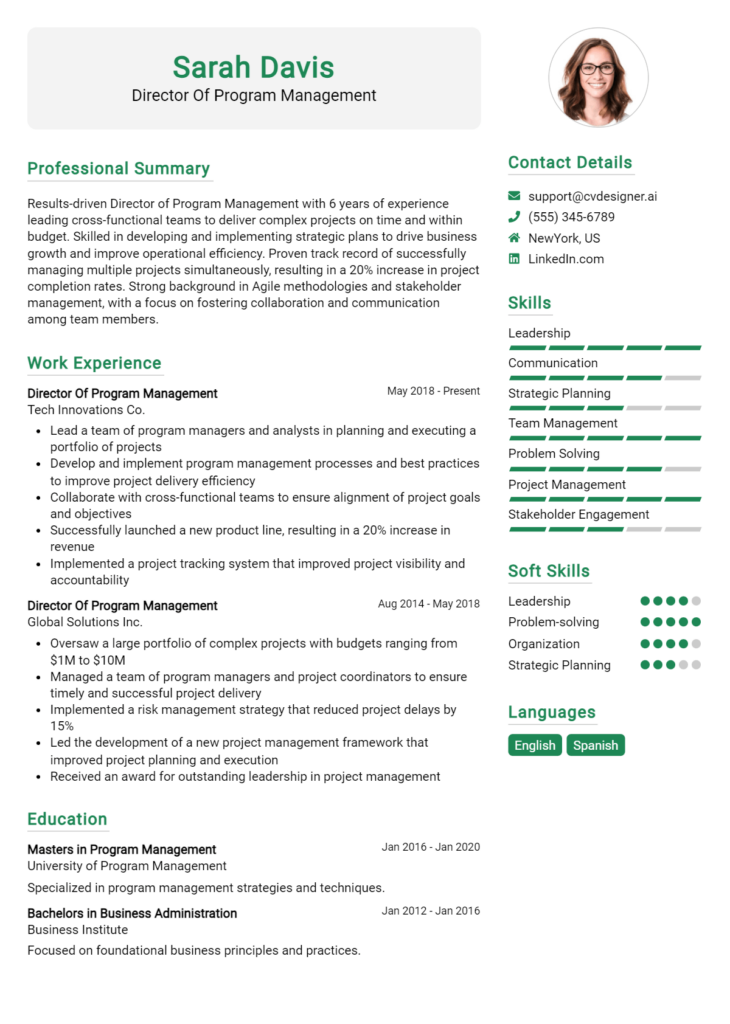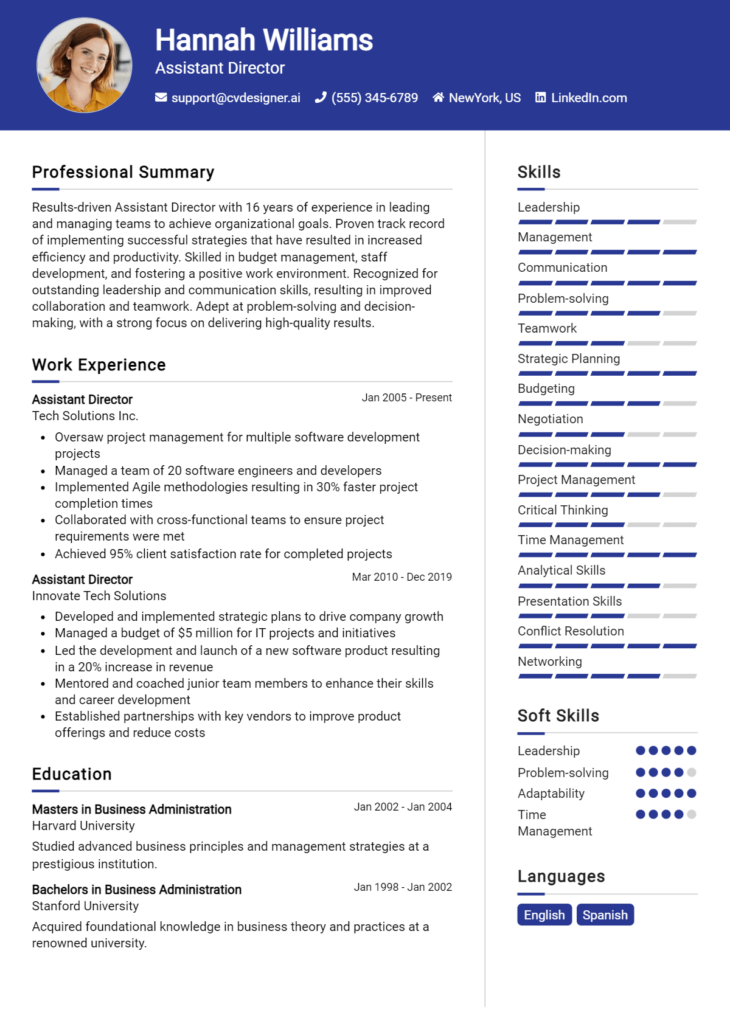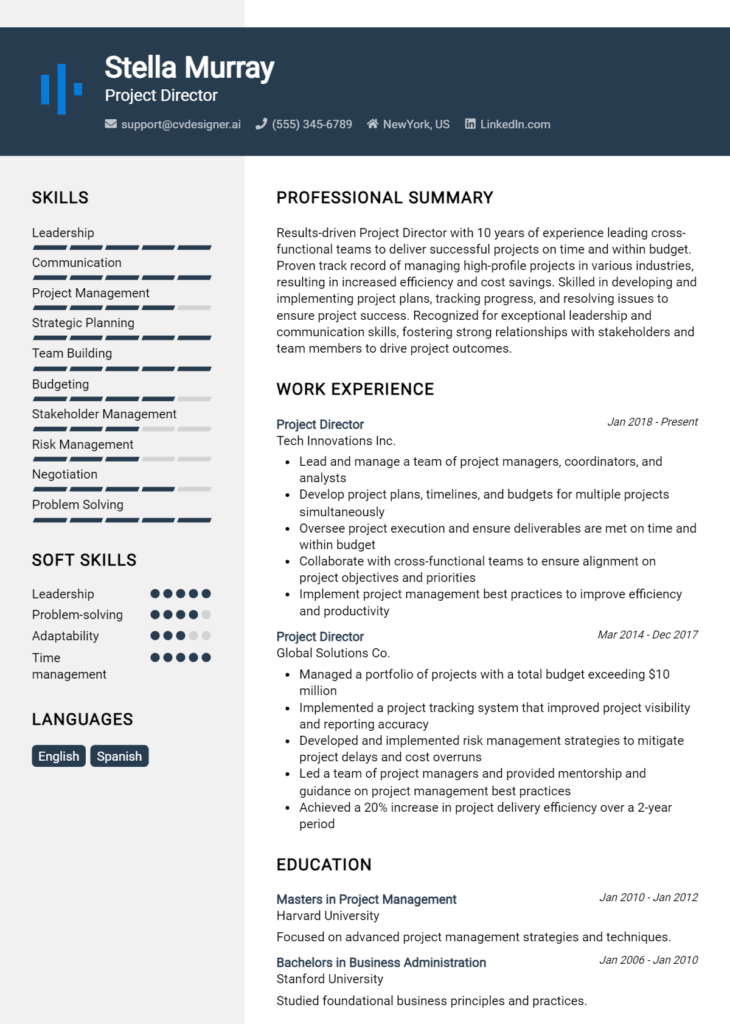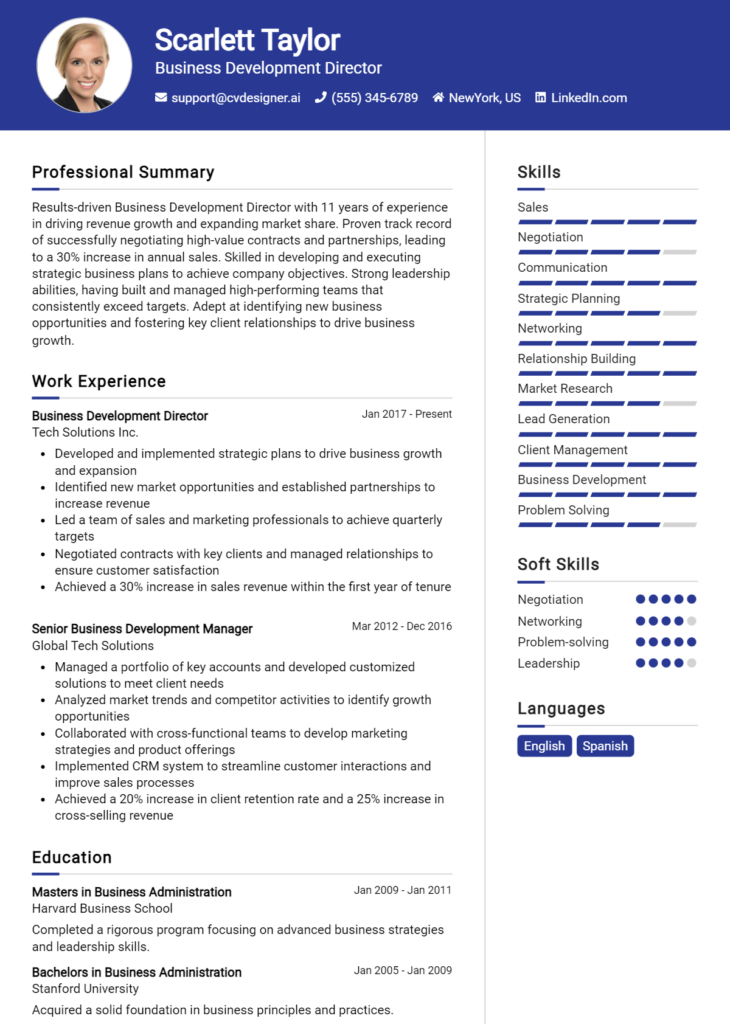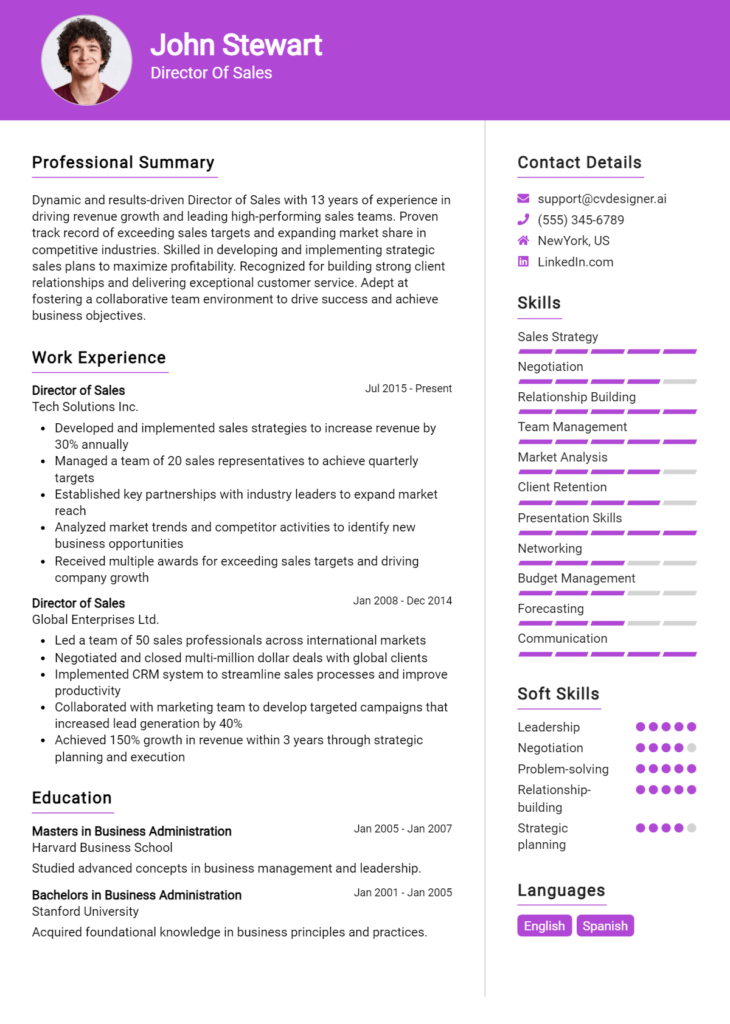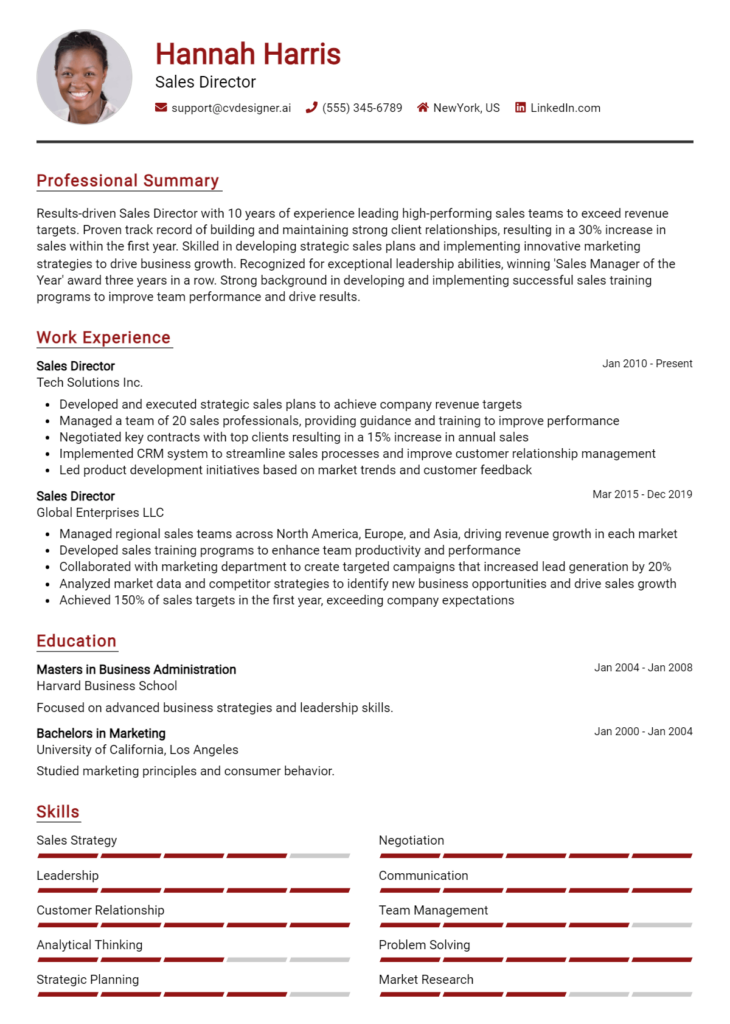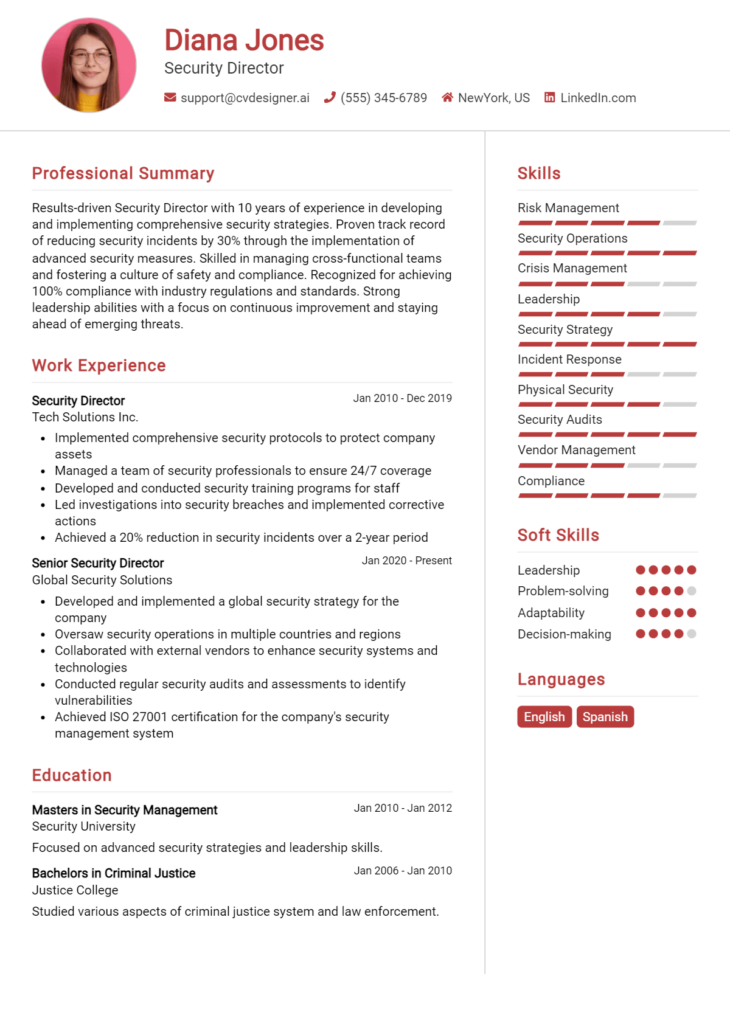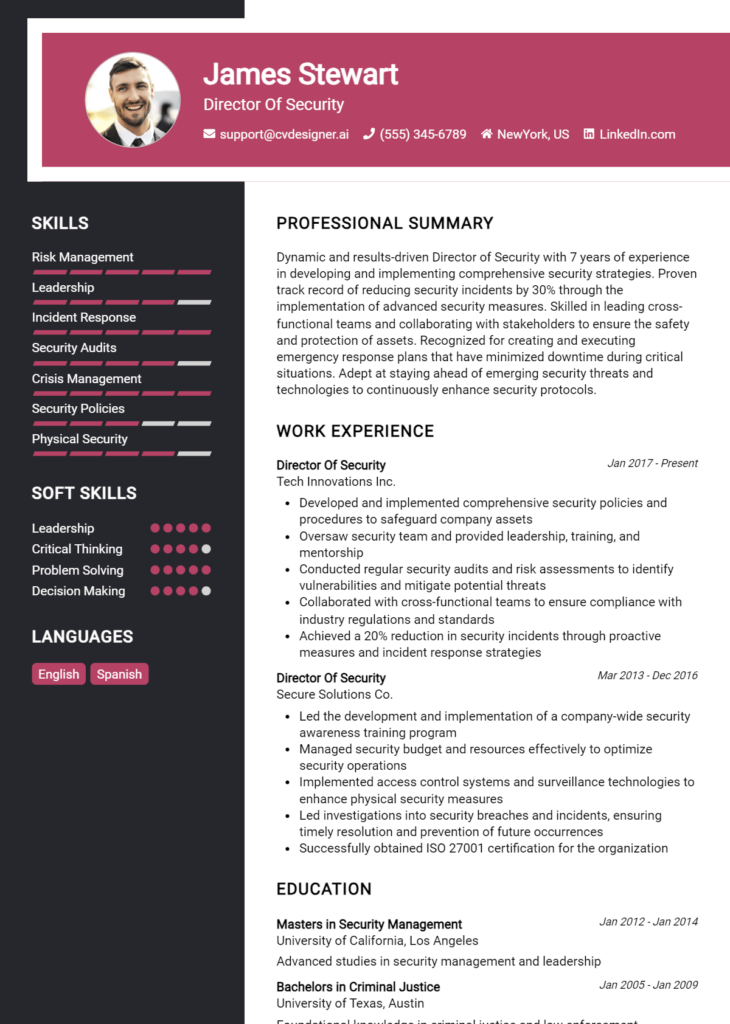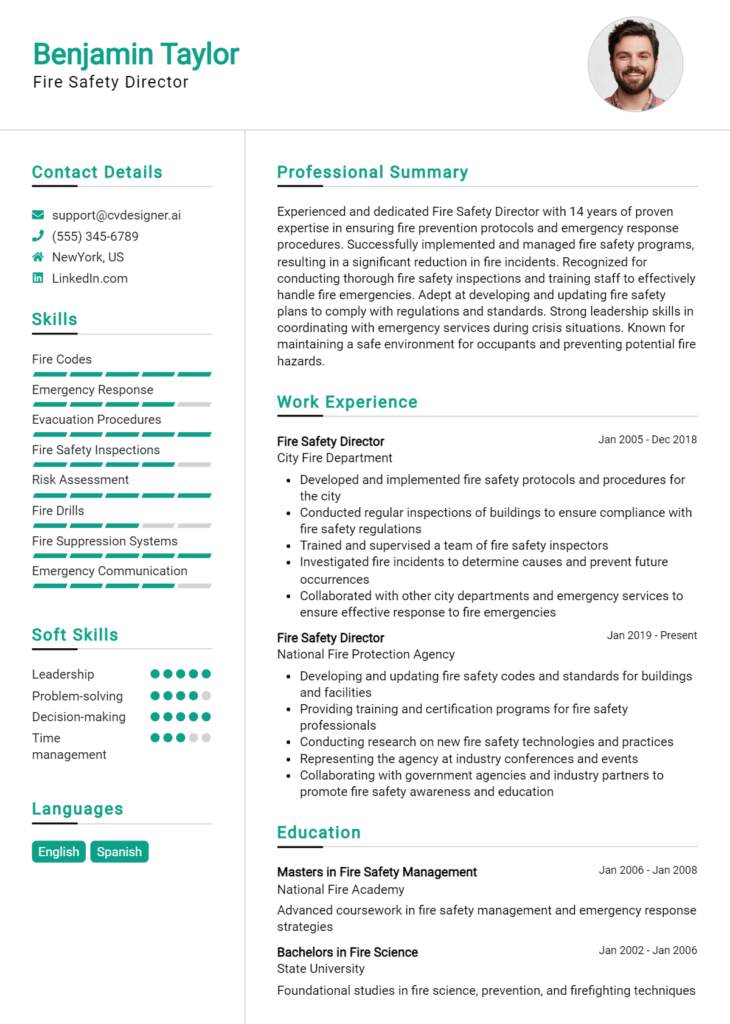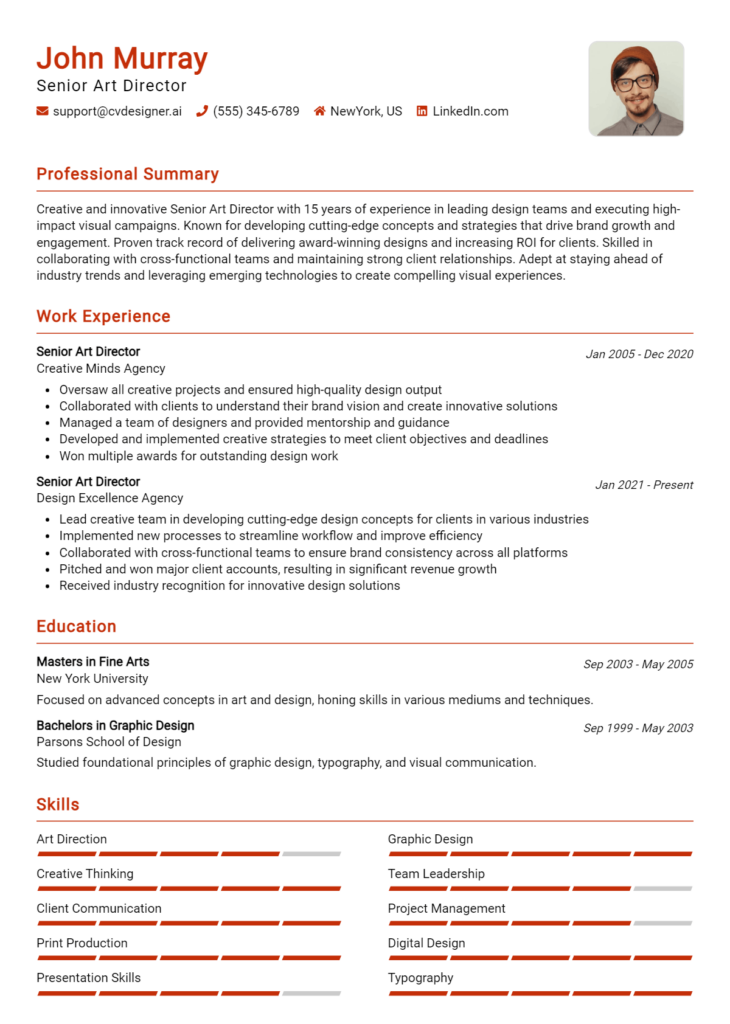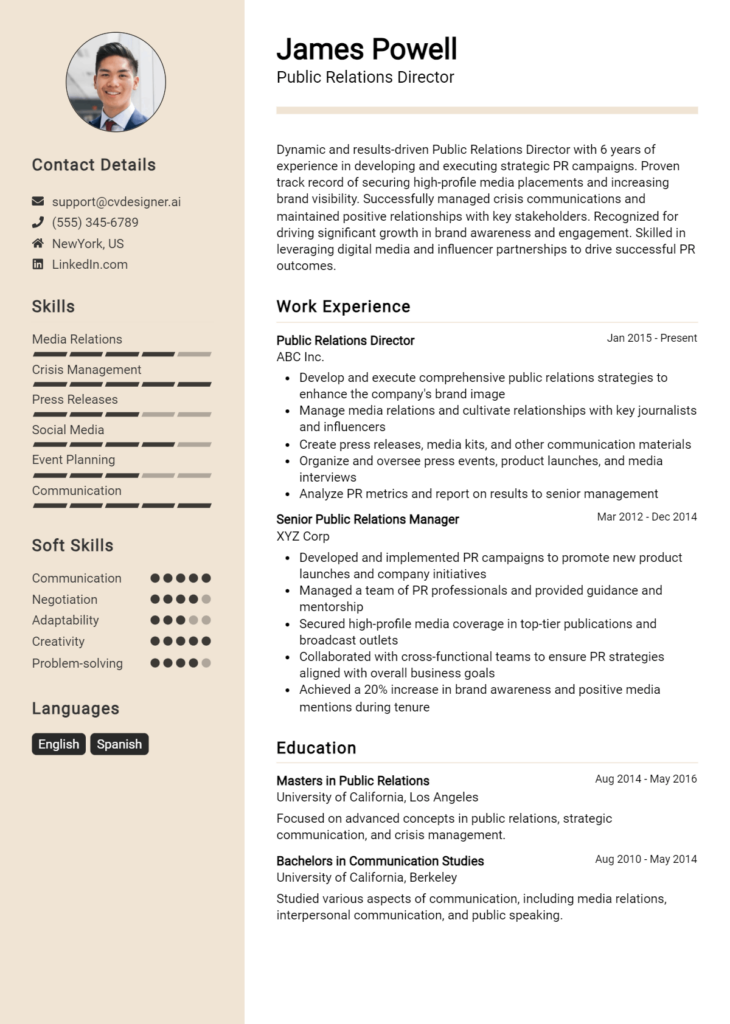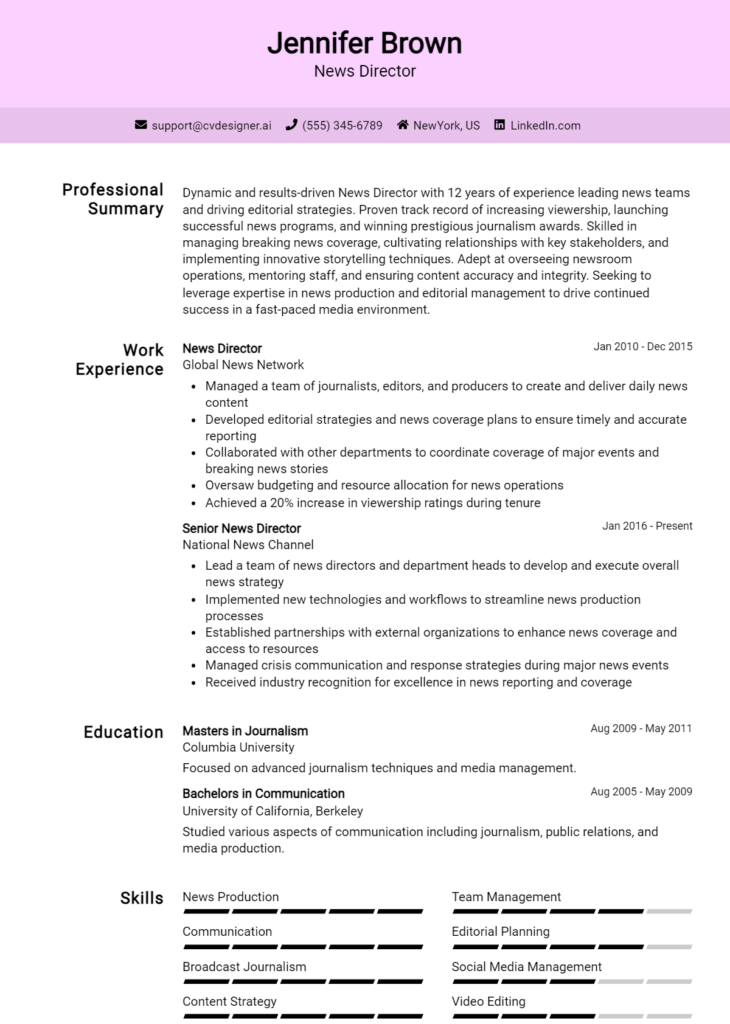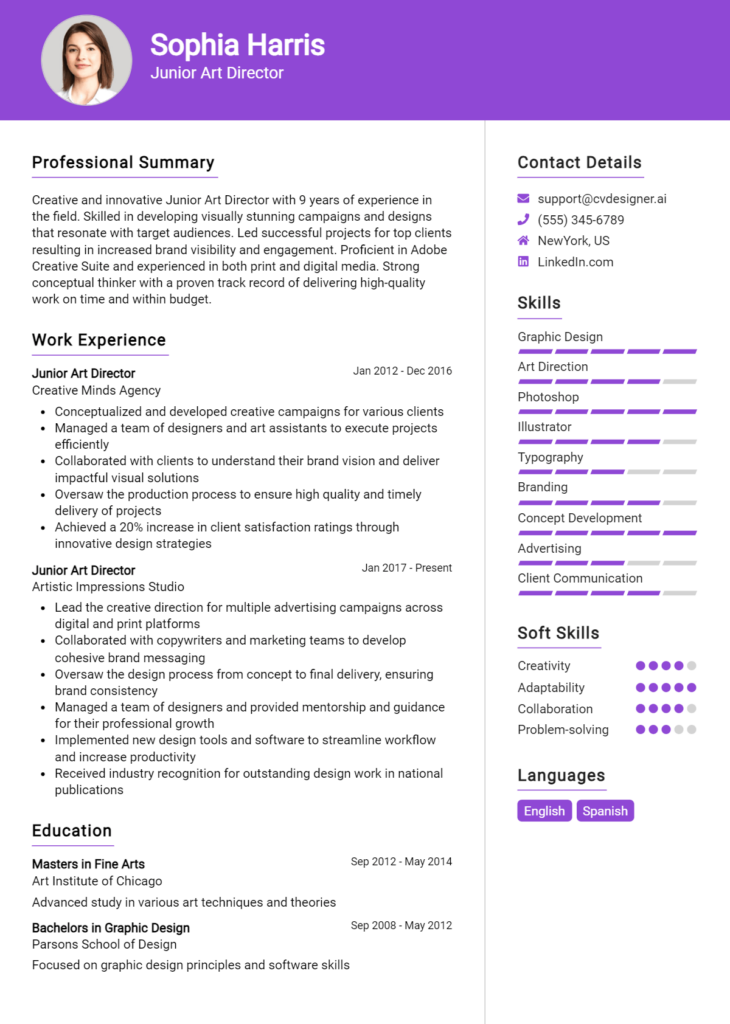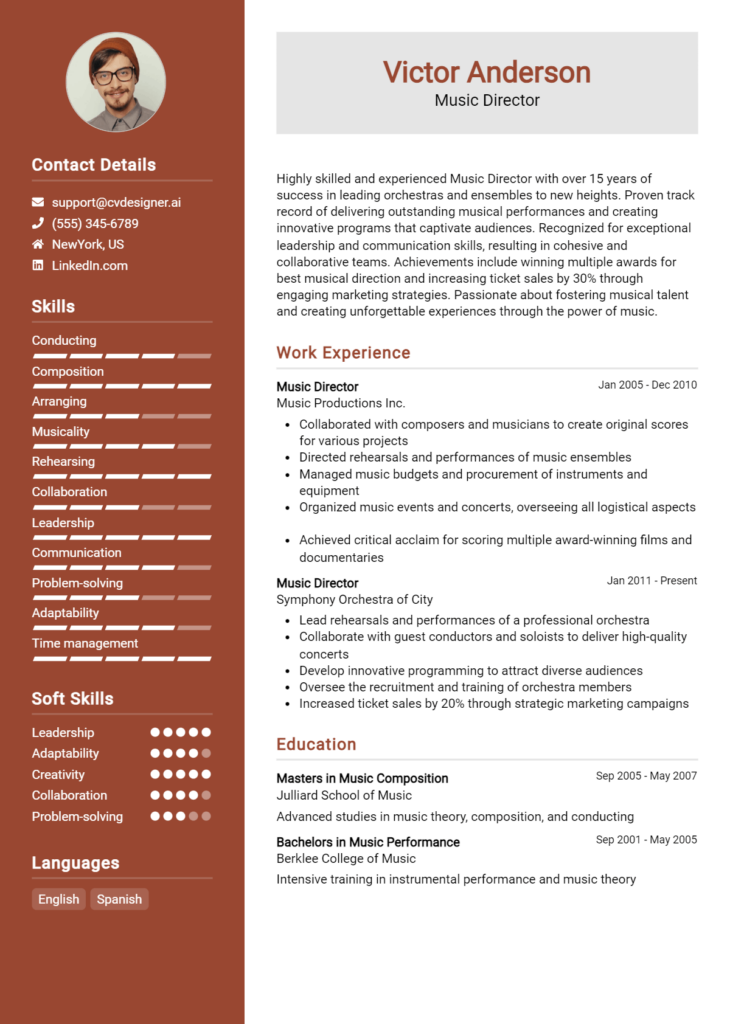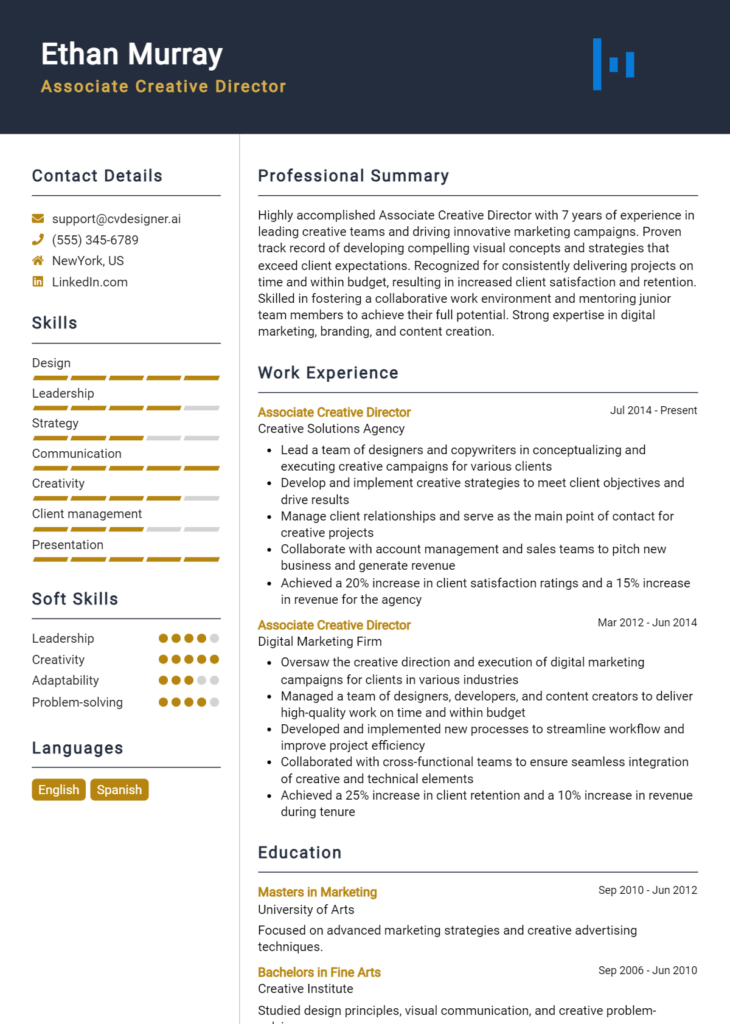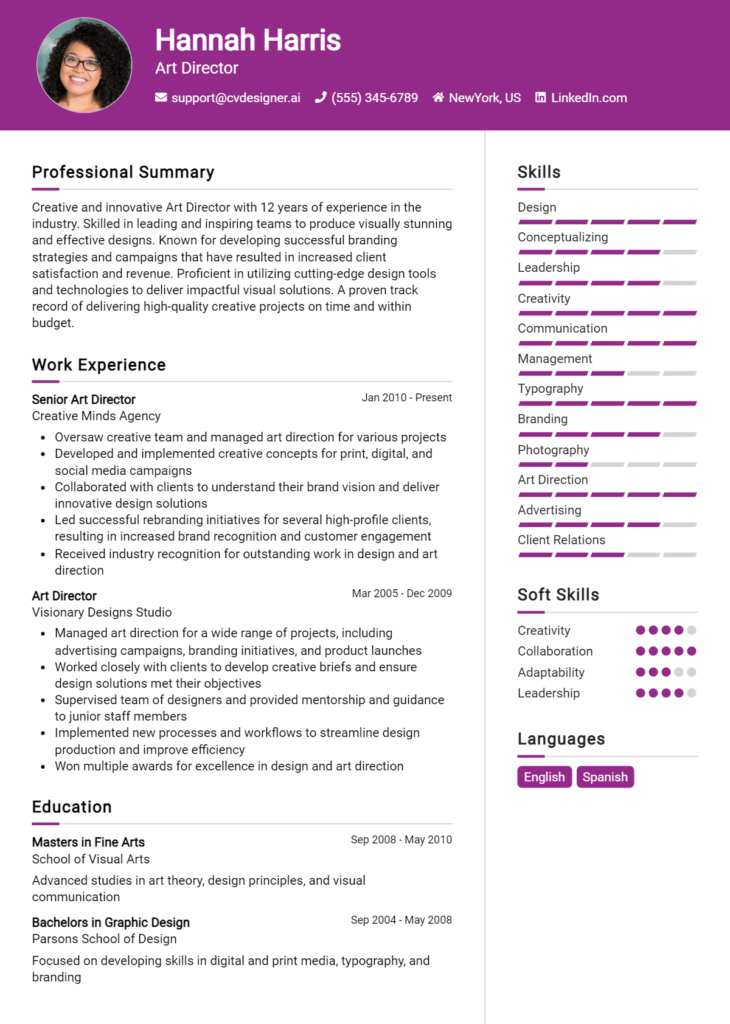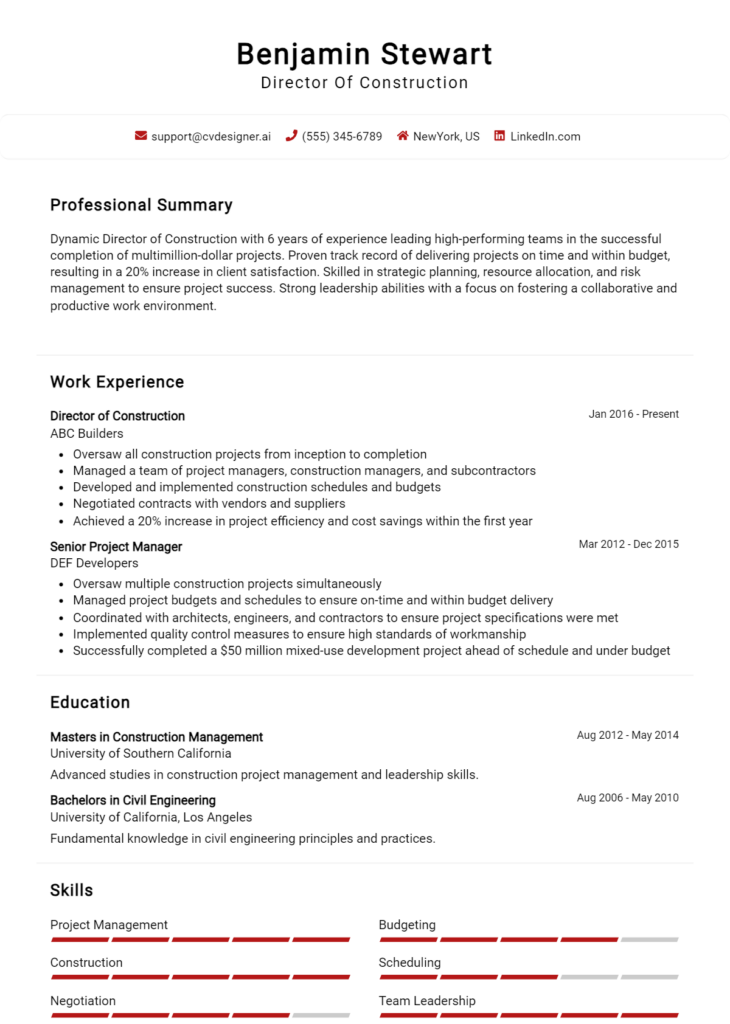Most Popular Executive Director Resume Examples
Explore additional Executive Director resume samples and guides and see what works for your level of experience or role.
As an Executive Director, you hold a pivotal role that shapes the vision and direction of your organization. This leadership position demands not only a wealth of experience and strategic thinking but also a well-crafted resume that effectively communicates your unique value proposition to potential employers. In today's competitive job market, a compelling resume can be the deciding factor that sets you apart from other candidates. A great resume showcases your leadership abilities, strategic accomplishments, and relevant skills, making it essential to take the time to tailor it appropriately.
In this comprehensive guide, we will delve into the critical components of an Executive Director resume. We’ll explore the key responsibilities and skills that should be highlighted, the best formats to use for maximum impact, and common mistakes to avoid that could hinder your chances of landing an interview. Additionally, we will provide resume examples tailored for various levels of experience, along with actionable tips on effective resume writing. You will also find guidance on selecting the right resume templates that align with your professional brand. Whether you’re crafting your first resume for an Executive Director position or looking to refine an existing one, this guide is your roadmap to success.
Key Responsibilities and Skills for a Executive Director
As an Executive Director, you hold a pivotal leadership role within an organization, responsible for steering the strategic direction, managing operations, and ensuring the overall success of the organization. Your key responsibilities typically include:
- Developing and implementing strategic plans to meet organizational goals.
- Overseeing financial management, including budgeting, forecasting, and financial reporting.
- Leading and managing senior staff and fostering a collaborative organizational culture.
- Engaging with the board of directors to inform them of organizational developments and strategic initiatives.
- Building and maintaining relationships with stakeholders, including donors, community organizations, and government entities.
- Ensuring compliance with legal and regulatory requirements.
- Representing the organization at public events and in communications.
To excel in this role, the following essential skills are required:
- Leadership and management skills
- Strategic planning and vision
- Financial acumen and budget management
- Strong communication and interpersonal skills
- Problem-solving and decision-making abilities
- Knowledge of nonprofit governance and compliance
- Ability to build and maintain stakeholder relationships
Highlighting these skills effectively in the resume skills section is crucial for presenting yourself as a strong candidate. Tailoring these responsibilities and skills to align with the specific job description can significantly enhance your application. Reflect on how these skills not only relate to the Executive Director role but also how they can be relevant in crafting a compelling CV. By doing so, you position yourself as a well-rounded candidate capable of leading an organization towards its mission and goals.
Best Resume Format and Structure for a Executive Director
When crafting a resume for the role of Executive Director, selecting the right format and structure is essential, as it can significantly impact how your qualifications are perceived. Here’s a detailed guide to creating an effective Executive Director resume.
Contact Information
Begin your resume with your contact details at the top. Include your full name, phone number, email address, and LinkedIn profile (if applicable). Ensure this information is clear and easy to find.
Professional Summary
This section should be a brief paragraph (3-5 sentences) summarizing your career achievements, leadership style, and core competencies. Tailor it to highlight your extensive experience in executive roles, your strategic vision, and your ability to drive organizational success. Use strong action verbs and quantifiable achievements.
Work Experience
List your work history in reverse chronological order, starting with your most recent position. For each role, include the following:
- Job Title: Clearly state your position.
- Company Name: Include the name of the organization and its location.
- Dates of Employment: Specify the time frame (month/year to month/year).
- Key Responsibilities and Achievements: Use bullet points to outline your responsibilities, emphasizing leadership roles and strategic initiatives. Quantify your accomplishments with metrics (e.g., “Increased revenue by 30% over two years” or “Led a team of 50 staff members”).
Education
List your educational qualifications, starting with the highest degree earned. Include the degree name, institution, and graduation date. If you have relevant certifications or additional training, you may include those as well.
Skills
Create a section dedicated to your core skills, focusing on those relevant to the Executive Director role. Consider including:
- Strategic Planning
- Financial Management
- Team Leadership
- Stakeholder Engagement
- Fundraising and Development
- Policy Development
Be sure to tailor this section to reflect the skills mentioned in the job description.
Certifications
If you hold any professional certifications relevant to the Executive Director role, list them here. This may include leadership training, project management certifications, or industry-specific qualifications.
Additional Tips:
- Format: Choose a clean, professional layout. A reverse-chronological format is generally preferred for executive-level roles, as it emphasizes your career progression and key achievements.
- Font and Size: Use a professional font such as Arial or Times New Roman, in a size between 10-12 points for readability.
- Length: Given the nature of an Executive Director position, your resume may extend to two pages, especially if you have extensive experience. However, ensure that every section adds value and is relevant.
This format can complement a corresponding cover letter effectively. In your cover letter, you can delve deeper into specific achievements or projects mentioned in your resume, providing a narrative that supports your qualifications. A cohesive design and tone between your resume and cover letter will present a unified professional image to potential employers.
By following this structured approach, you will create a compelling resume that showcases your qualifications for an Executive Director role while ensuring clarity and professionalism.
Writing Tips and Best Practices for a Executive Director Resume
Crafting a compelling resume as an Executive Director requires a strategic approach that highlights your leadership skills and significant contributions to previous organizations. Focus on creating a clear, concise document that not only outlines your experience but also showcases your achievements in measurable terms. Utilize industry-specific keywords to help your resume stand out to hiring managers and applicant tracking systems. Remember to tailor your resume to each application, emphasizing the skills and experiences most relevant to the job description. Additionally, consider how these practices can equally enhance your cover letter, allowing you to present a cohesive narrative of your professional journey.
- Use strong action verbs such as "led," "developed," "implemented," and "optimized" to convey your leadership and initiative.
- Quantify your achievements whenever possible; for example, mention the percentage of revenue growth or the number of new programs launched under your direction.
- Incorporate industry-specific keywords that align with the job description to ensure your resume passes through applicant tracking systems.
- Keep the layout clean and professional, using bullet points for easy readability and clear organization.
- Tailor each resume to the specific organization and role by highlighting the most relevant experiences and skills.
- Include a summary statement at the top that encapsulates your vision and leadership style, making it compelling for hiring committees.
- Limit your resume to two pages to maintain conciseness while still providing enough detail to showcase your qualifications.
- Regularly update your resume to reflect new skills, certifications, and experiences, ensuring it remains relevant and impactful.
For more comprehensive guidance, refer to resume writing tips that can help you achieve a polished and effective presentation. Don't forget to apply similar strategies when drafting your cover letter to create a unified and persuasive application.
Common Mistakes to Avoid in a Executive Director Resume
Crafting a compelling resume for an Executive Director position is crucial for standing out in a competitive job market. However, many candidates make common mistakes that can undermine their qualifications and experience. To ensure your resume effectively showcases your leadership abilities and achievements, it's essential to avoid these pitfalls. Below are some common mistakes that can detract from an otherwise strong resume:
- Overloading the resume with excessive information, making it difficult for hiring managers to identify key qualifications.
- Using generic descriptions that fail to convey the unique skills and experiences relevant to the Executive Director role.
- Neglecting to quantify achievements with specific metrics or results, which can diminish the impact of your contributions.
- Failing to tailor the resume to the specific organization or industry, resulting in a lack of connection with the job requirements.
- Using a cluttered format or outdated design that detracts from the professionalism of the resume.
- Including irrelevant work experience or skills that do not pertain to the Executive Director position.
- Using passive language rather than strong action verbs, which can make accomplishments seem less impressive.
- Omitting important sections such as leadership philosophy or relevant certifications that highlight your qualifications.
- Not proofreading for spelling and grammatical errors, which can signal a lack of attention to detail.
- Ignoring the importance of a strong summary statement that clearly articulates your vision and leadership style.
To enhance your resume and avoid these common mistakes, consider reviewing the common mistakes to avoid in a resume. Additionally, don't overlook the significance of your cover letter; ensure you also avoid typical cover letter mistakes to present a cohesive and professional application package.
Sample Executive Director Resumes
When applying for the role of Executive Director, having a well-structured resume is crucial to showcase your skills, experience, and leadership capabilities. Below are three sample resumes tailored for different career stages: an experienced professional, an entry-level candidate, and a career changer. These examples can serve as a guide to help you craft your own resume for this vital leadership position.
Sample Resume: Experienced Executive Director
Name: John Smith
Address: 123 Leadership Lane, City, State, ZIP
Phone: (123) 456-7890
Email: john.smith@email.com
Professional Summary
Dynamic and results-driven Executive Director with over 15 years of experience in strategic leadership, nonprofit management, and program development. Proven ability to drive organizational growth, increase funding, and enhance community engagement. Exceptional skills in stakeholder management and team leadership.
Professional Experience
Executive Director
ABC Nonprofit Organization, City, State
January 2015 – Present
- Spearheaded initiatives that increased annual funding by 40%, resulting in expanded programs and services.
- Developed and implemented a strategic plan that enhanced community outreach and engagement by 60%.
- Led a team of 50+ staff and volunteers, fostering a collaborative and high-performance culture.
Director of Operations
XYZ Foundation, City, State
June 2010 – December 2014
- Managed day-to-day operations and increased operational efficiency by 30%.
- Cultivated relationships with key donors and stakeholders, boosting donor retention rates by 25%.
- Oversaw grant writing and fundraising strategies that secured over $1 million in funding.
Education
Master of Public Administration
University of State, City, State
Graduated: May 2009
Bachelor of Arts in Sociology
State University, City, State
Graduated: May 2005
Skills
- Strategic Planning
- Fundraising & Grant Writing
- Team Leadership
- Community Engagement
- Financial Management
Sample Resume: Entry-Level Executive Director
Name: Emily Johnson
Address: 456 New Beginnings, City, State, ZIP
Phone: (987) 654-3210
Email: emily.johnson@email.com
Professional Summary
Motivated and passionate recent graduate with a background in nonprofit management and community service. Eager to leverage leadership skills and fresh perspectives to contribute to organizational success as an Executive Director.
Professional Experience
Program Coordinator Intern
Helping Hands Organization, City, State
January 2023 – Present
- Assisted in developing and implementing community programs that served over 500 local residents.
- Collaborated with staff to enhance volunteer engagement, resulting in a 20% increase in volunteer hours.
- Conducted research to support grant proposals, contributing to a successful funding campaign.
Volunteer Coordinator
University Student Council, City, State
September 2021 – December 2022
- Organized and led volunteer initiatives that engaged over 300 students in community service.
- Developed training materials for new volunteers, enhancing onboarding processes.
Education
Bachelor of Arts in Nonprofit Management
University of State, City, State
Graduated: May 2023
Skills
- Program Development
- Volunteer Management
- Event Planning
- Communication
- Research & Analysis
Sample Resume: Career Changer to Executive Director
Name: Michael Brown
Address: 789 Transition Road, City, State, ZIP
Phone: (321) 654-9870
Email: michael.brown@email.com
Professional Summary
Innovative professional with over 10 years of experience in corporate management seeking to transition to the Executive Director role in the nonprofit sector. Demonstrated ability to lead teams, manage projects, and drive strategic initiatives to achieve organizational goals.
Professional Experience
Operations Manager
Global Tech Solutions, City, State
March 2015 – Present
- Directed a team of 30 employees, implementing process improvements that increased productivity by 35%.
- Managed budgets and resources effectively, achieving cost savings of $500,000 annually.
- Led cross-departmental projects that enhanced service delivery and customer satisfaction.
Project Coordinator
Innovative Marketing Group, City, State
June 2012 – February 2015
- Coordinated marketing campaigns that increased brand awareness and engagement by 50%.
- Developed and maintained project timelines, ensuring on-time and within-budget delivery.
Education
Master of Business Administration
State University, City, State
Graduated: May 2012
Bachelor of Science in Business Management
State College, City, State
Graduated: May 2009
Skills
- Project Management
- Budgeting & Financial Planning
- Team Development
- Stakeholder Engagement
- Strategic Planning
For additional inspiration on crafting your resume, explore more resume examples. Don't forget that corresponding cover letter examples can help create a complete job application package, enhancing your chances of landing that Executive Director position.
Checklist for a Executive Director Resume
- Proofread for Errors: Carefully check for any spelling, grammar, or punctuation mistakes. Reading your resume aloud can help catch errors you might overlook.
- Consistency in Formatting: Ensure that fonts, sizes, and styles (bold, italics) are consistent throughout the document. This includes alignment, bullet points, and spacing.
- Tailor Your Resume: Customize your resume for each job application by incorporating keywords from the job description and highlighting relevant experiences that align with the role of Executive Director.
- Highlight Leadership Experience: Emphasize your leadership roles, accomplishments, and the impact you’ve made in previous positions. Quantify your achievements with specific metrics where possible.
- Clear and Concise Language: Use clear, concise language and avoid jargon. Each bullet point should communicate your achievements effectively without overwhelming the reader.
- Professional Summary: Include a strong professional summary at the top of your resume that encapsulates your career goals, skills, and what you bring to the Executive Director role.
- Contact Information: Make sure your contact information is up to date and prominently displayed. Include your LinkedIn profile if applicable.
- Review Length and Relevance: Keep your resume to a maximum of two pages and ensure that all information is relevant to the Executive Director position. Remove any outdated or unrelated experiences.
- Use an AI Resume Builder: Consider using an AI resume builder to ensure all elements are well-organized and visually appealing, which can help in making a strong impression.
- CV Checklist: Remember, a similar checklist can be followed for creating a CV. Tailoring and proofreading are just as essential for this document.
Key Takeaways for a Executive Director Resume Guide
Crafting a compelling Executive Director resume is crucial for standing out in a competitive job market. By utilizing the examples and tips provided in this guide, you can effectively showcase your leadership skills, strategic vision, and impactful accomplishments. Remember to tailor your resume to fit the specific requirements of each role you apply for, highlighting relevant experiences that align with the organization's mission and goals. As a next step, consider downloading a professionally designed template from resume templates to ensure your resume is visually appealing and well-structured. Additionally, don’t overlook the importance of a strong cover letter; explore our selection of cover letter templates to complement your application. For those looking for a more personalized approach, try our best resume maker to create a resume that reflects your unique professional journey. Take these steps today and enhance your chances of landing that Executive Director position you desire!
